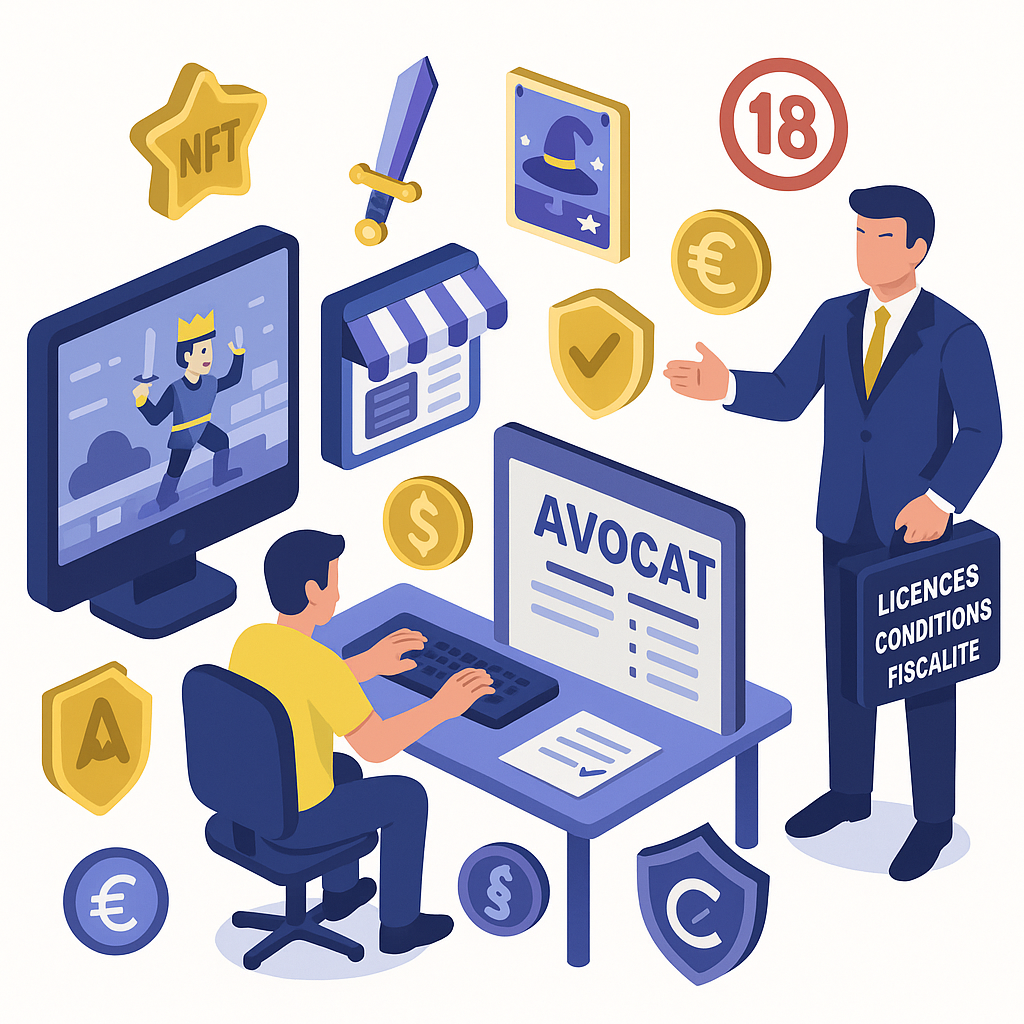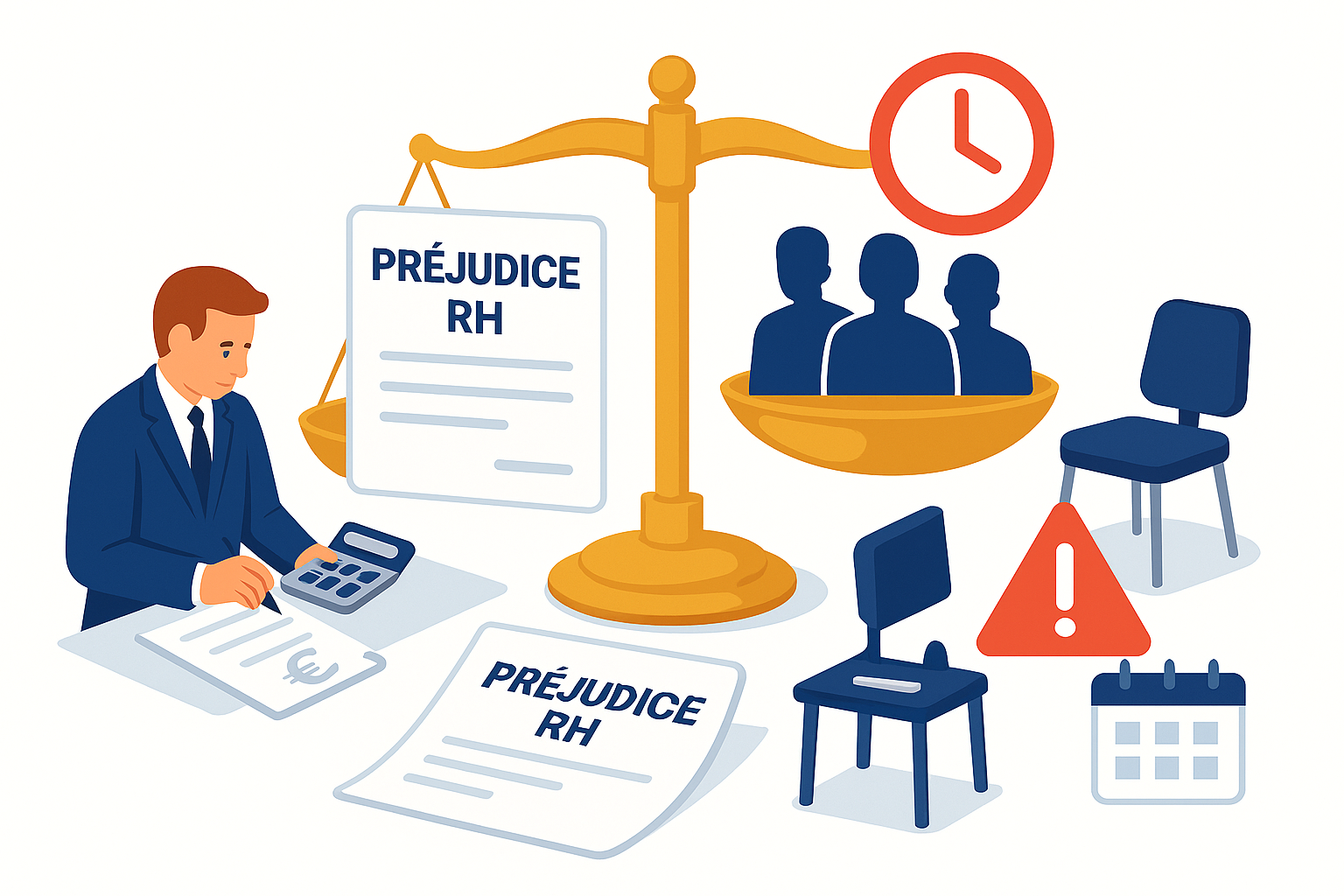The gaming world is undergoing a profound transformation with the emergence of monetizable digital objects. This revolution, propelled by blockchain technologies and innovative business models, offers new opportunities for developers and gamers, but also raises important legal issues.
In this ever-changing environment, the support of a lawyer becomes a strategic asset for navigating safely in this new ecosystem.
If you need a lawyer for online gaming, contact me!
The emergence of monetizable digital objects: a changing paradigm
The concept ofmonetizable digital objects refers to virtual assets integrated into video games that can be acquired, traded or sold by players. These assets take a variety of forms: equipment for avatars, characters, virtual terrain or even cosmetic items. What sets them apart is their real economic value, which transcends the closed environment of the game.
This new ecosystem is structured around several business models:
- Play-to-Earn (P2E), which enables players to generate revenue by playing
- NFT Gaming, which uses non-fungible tokens as gaming objects
- Metavers, which create complex virtual economies with their own digital asset markets
- Loot boxes and other chance mechanisms offering virtual rewards of varying value
L’éclairage stratégique d’un juriste se révèle particulièrement précieux pour comprendre les implications légales spécifiques à chaque modèle. Un avocat expert en droit du jeu vidéo analyse les mécaniques de jeu sous le prisme juridique, identifiant les risques potentiels de requalification et les obligations réglementaires applicables selon les territoires visés.
Legal grey areas and regulatory risks
The inclusion of monetizable digital objects in video games creates areas of legal uncertainty, with several bodies of legislation overlapping.
The risk of reclassification as gambling or game of chance
The boundary between video games and gambling becomes porous when mechanisms are introduced to convert virtual objects into real monetary value. This porosity exposes developers to a major risk: the requalification of their game as gambling or game of chance, with the draconian regulatory consequences that this entails.
In France, the recent law of May 21, 2024 introduces controlled experimentation for games offering digital objects that can be monetized by chance, but sets strict conditions, including a ban on direct conversion into legal tender.
The preventive legal expertise of an online gaming lawyer is an essential bulwark against this risk of requalification. Through a meticulous analysis of game mechanisms and associated economic flows, he assesses the model's conformity with jurisprudential and regulatory criteria, enabling the design of the game to be adjusted upstream to avoid legal pitfalls.
Consumer protection issues
Consumer protection obligations fully apply to the video game economy, with reinforced requirements in the context of monetizable digital objects:
- Probability transparency in random mechanisms
- Clear information on how to acquire and use digital objects
- Protection against misleading commercial practices
- Right of withdrawal and its limitations specific to digital content
The operational support of legal counsel transforms these constraints into confidence-building factors for your gaming community. A lawyer drafts robust terms and conditions, designs legally compliant purchase interfaces and develops balanced refund policies, protecting both your business interests and consumer rights.
Protecting minors: a central concern
The growing presence of minors in the gaming ecosystem raises particularly sensitive legal issues when monetization mechanisms are involved. The French law of 2024 reserves access to games offering monetizable digital objects to adult players only, with strict age verification requirements.
A lawyer's forward-looking vision enables you to anticipate these constraints by implementing robust age verification systems, adapted to regulatory requirements while preserving the user experience. His expertise can also guide you in the design of ethical game mechanics, limiting the risks of addiction and overspending by young players.
Legal issues specific to monetizable digital objects
Beyond general questions of video game law, monetizable digital objects raise specific legal issues that call for specialized expertise.
Intellectual property and players' rights
One of the most complex legal debates concerns the exact nature of the rights conferred to players over the digital objects they acquire. Unlike physical goods, these virtual assets exist in an environment controlled by the developer, raising fundamental questions:
- Do players really own their digital assets, or do they just have a license to use them?
- What rights remain if the game is shut down or if the developers modify the rules?
- How do you protect the intellectual property of creators while guaranteeing certain rights to players?
L’expertise juridique ciblée qu’apporte un avocat en droit du numérique et des jeux permet de structurer clairement ces relations complexes. Il élabore des cadres contractuels équilibrés, définissant précisément les droits concédés aux joueurs tout en préservant votre liberté créative et vos prérogatives d’exploitation. Cette clarification juridique constitue un avantage compétitif majeur dans un marché où la confiance des utilisateurs est déterminante.
Taxation of monetizable digital objects
The economic dimension of monetizable digital objects raises important tax issues for developers and gamers alike. The tax classification of these assets remains uncertain in many jurisdictions, oscillating between intangible property, digital services or, in some cases, cryptocurrency-like digital assets.
The strategic tax support offered by a lawyer enables you to legally optimize your business model. In collaboration with certified accountants, he structures your financial flows in such a way as to comply with your reporting obligations, while avoiding over-taxation. For platforms facilitating exchanges between players, he also develops information mechanisms that comply with tax reporting obligations.
International regulatory compliance
The inherently cross-border nature of online gaming makes regulatory compliance a complex issue. Legislation applicable to monetizable digital objects varies significantly from country to country, some adopting progressive approaches, others imposing drastic restrictions.
La planification juridique territoriale constitue l’une des plus-values majeures d’un avocat pour les jeux en ligne. Grâce à sa connaissance des régimes juridiques internationaux et de leurs évolutions, il élabore une stratégie de déploiement adaptée à votre ambition commerciale. Cette approche peut inclure des adaptations territoriales de votre modèle économique, des restrictions géographiques ciblées ou encore des partenariats avec des entités locales pour faciliter la conformité.
The essential role of an online gaming lawyer in your strategy
Given the complexity and rapid evolution of the legal framework applicable to monetizable digital objects, the support of a lawyer represents much more than a compliance initiative: it is a real competitive advantage.
Preventive legal protection
L’approche préventive constitue la voie la plus efficiente pour éviter les contentieux coûteux et les blocages réglementaires. Un avocat pour les jeux en ligne intervient idéalement dès la phase de conception pour :
- Analyze the compliance of game mechanics with the various applicable regulations
- Structuring contractual relations with players, partners and service providers
- Design age and identity verification processes that comply with legal requirements
- Develop an intellectual property strategy to protect your creations while securing digital asset transactions
The added value of anticipatory legal advice lies in its ability to integrate legal constraints as design parameters, thus avoiding costly redesigns after launch. This proactive vision transforms legal expertise into a catalyst for responsible innovation.
Ongoing operational support
Beyond the initial phase, a lawyer will support you throughout the life cycle of your game, adapting your legal strategy to the evolution of the product and the regulatory framework:
- Regular updating of contractual documents and legal notices
- Targeted legal watch for changes in standards impacting your model
- Management of relations with regulatory authorities (ANJ, CNIL, DGCCRF)
- Support in handling user complaints with a legal dimension
- Securing marketing operations and commercial communications
L’accompagnement juridique agile que propose un avocat en droit des jeux en ligne permet d’adapter continuellement votre stratégie de conformité sans entraver votre dynamique d’innovation. Sa connaissance approfondie de votre produit et de ses enjeux spécifiques lui permet d’identifier rapidement les risques émergents et d’y apporter des réponses proportionnées. En matière de protection des données personnelles, la collaboration avec un avocat spécialisé CNIL garantit le respect du RGPD.
Litigation management and advocacy
Despite preventive measures, contentious situations can arise, involving disgruntled players, regulatory authorities or competitors. In such circumstances, representation by a lawyer with in-depth knowledge of your industry is a decisive asset.
Expert legal protection from a lawyer well-versed in the specificities of online gaming law guarantees you an informed and effective defense. His mastery of case law specific to the sector and his ability to explain complex game mechanics to magistrates often help defuse situations potentially damaging to your reputation and business.
Making the law an ally of your innovation
In the dynamic and complex ecosystem of games incorporating monetizable digital objects, legal expertise should not be seen as a constraint, but as a genuine strategic lever. By transforming regulatory requirements into opportunities for responsible innovation, a lawyer contributes directly to building a sustainable business model and the confidence of your community.
If you'd like to take your projects involving monetizable digital objects a step further, don't hesitate to consult our expertise in this field. Our firm has in-depth knowledge of the gaming industry, combining a mastery of technological issues with a thorough understanding of national and international regulatory frameworks.




